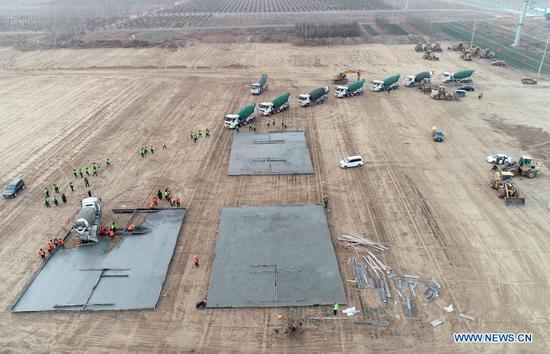
An employee works at an oil extraction site in the south of Junggar Basin in the Xinjiang Uygur autonomous region on Dec 19, 2020. (Photo by ZHOU JIANLING/XINHUA)
State-owned enterprises, including China National Offshore Oil Corp and State Power Investment Corp, have announced their timeline for achieving corporate carbon neutrality and increasing their clean energy installed power capacity to contribute to the national goal, which analysts said was in line with the government's pledge to make the country carbon neutral by 2060.
"State-owned companies play a crucial role in supporting China's new national climate pledge, and greening China's industry sector through corporate carbon neutral actions and a green supply chain would support China transformation from the world's factory to the world's green factory," said Li Ting, managing director and chief representative of the China program of the Rocky Mountain Institute, a clean energy NGO based in the United States.
CNOOC launched a carbon neutrality project on Friday to comprehensively promote the company's transformation to green and low-carbon development.
The company is setting up a specialized research institution, including several departments to launch the design, study and formulation of the company's carbon emission reduction road map and carbon-neutrality project.
State Power Investment Corp, one of China's top five power generators, announced that 56.09 percent of its total installed capacity was from clean energy in 2020, up 5.52 percentage points year-on-year.
It also plans to raise its installed power capacity to more than 220 gigawatts by 2025, with more than 60 percent from clean energy, in order to build a stable, safe and economical clean energy system based on a mix of hydropower, wind power, photovoltaic and energy storage.
The new targets set by the country's SOEs are a major step forward and might be followed by many companies on the global stage, according to industry insiders.
"Through these efforts, China would become the largest global corporate green power market and a global leader in manufacturing energy efficiency, the circular economy and low-carbon logistics," said Li from the Rocky Mountain Institute China Program.
"As Chinese investment and industrial parks bloom in countries and regions participating in the Belt and Road Initiative, actions and innovation from the Chinese market would make a significant contribution to the ambitious goal of global carbon neutrality."
CNOOC said it will focus on improving the supply capacity of natural gas resources, accelerating the development of new energy industries and promoting clean and low-carbon energy in at least 60 percent of the energy mix during the 14th Five-Year Plan (2021-25).
It will actively involve itself in the establishment of a carbon credit trading market and focus on improving the company's carbon property management capacity.
"Natural gas will play an increasingly import role in CNOOC's decarbonization process, and the announcement will help prepare CNOOC for China's future with net-zero emissions," said Li Ziyue, an analyst with BloombergNEF.
"China's ambitious target of carbon neutrality has redefined the direction of the country's sustainable development," said Li Li, research director at energy consultancy ICIS China.
China aims to see carbon dioxide emissions peak before 2030 and achieve carbon neutrality before 2060.
"China's State-owned companies can be role models for cutting emissions, and for upstream companies like CNOOC, it's essential they reflect on future transitions and find the opportunities in change," she said.


















































